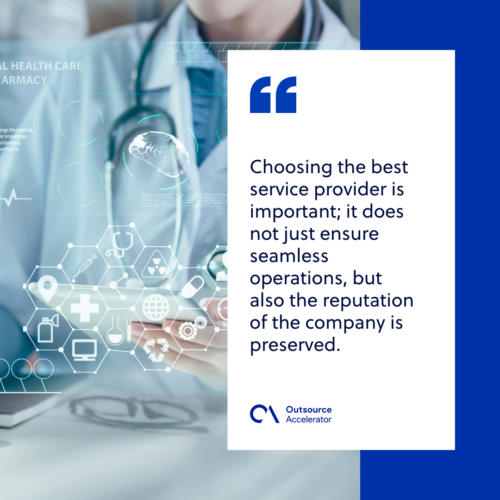Top reasons to consider data entry healthcare outsourcing

Healthcare organizations have a lot on their plate, from dealing with different types of patients to performing technical, rigorous procedures and working extended hours to ensure patients are taken care of.
There are too many stressors they need to manage, and adding to them might adversely impact the quality of care they provide.
Traditionally, healthcare providers need to process insurance claims, input patient records, and do the coding themselves. However, this has been proven to be inefficient, as there are tons of insurance claims that need to be processed every day.
With the advent of outsourcing and innovative technologies, healthcare organizations have the option to outsource data entry healthcare.
There are various benefits to outsourcing data entry healthcare. This article will elaborate on this.
Significance of data entry healthcare
Accuracy and consistency are integral to the healthcare industry’s processes, from providing the right information and diagnosis to billing healthcare procedures correctly.
However, with the lack of time and various stressors present in healthcare, this becomes quite challenging.
Healthcare organizations need to juggle their core competencies with non-core functions such as administrative work.
Data entry can easily solve this by assisting healthcare firms in the verification of insurance, processing of claims, and the data processing of the entire patient information.
In addition, outsourced medical data entry services can help index medical records for future use by healthcare providers.

4 reasons to consider healthcare data entry services
There are many beneficial reasons to outsource healthcare data entry. Aside from the usual cost-saving dimension, there is more than third-party services offer.
Below are the four main reasons:
1. Data entry is time-consuming
Due to technological innovations, patient records can be stored, reviewed, and extracted digitally through electronic medical records (EMR).
Electronic health records have become a staple in the current healthcare industry. However, the main disadvantage is that it takes significant time to input all healthcare records after each treatment and checkup.
2. Medical data entry professionals can be expensive
Traditionally, physicians and nurses manually input all of this information into the computer. This mundane and repetitive task is prone to human error.
Hiring in-house staff to manage this can be an alternative; however, it can be quite expensive.
Hence, outsourcing data entry specialists helps healthcare organizations in the long run. It is not just cost-saving but also allows healthcare professionals to accommodate more patients.
This means more time to do consultations, more profit, and more resources can be invested in innovation.

3. Medical records maintain accurate
Patient records are extremely important in delivering quality patient care. Healthcare organizations may opt to do it themselves or hire untrained staff.
However, this can lead to misinterpretations.
Inaccurate health records can lead to delays, misdiagnosis, and wrong prescriptions. This is troublesome as it can lead to unnecessary deaths or another visit to the hospital.
In the event that it happens, severe public outcry and sympathy for the victim will occur.
This makes the inputting of patient data crucial. Outsourcing data entry in healthcare mitigates these risks.
Potential lawsuits or reputational damage to the healthcare institution, which can result in heavy financial losses, are avoided.
Third-party providers often exhibit great accuracy and consistency in patient medical information, improving data management. They also help protect healthcare organizations and their patients from adverse situations and maintain data integrity.
4. Patient information is secured
With the advancement of technology and the Internet, private information has become too vulnerable to cyber attacks that jeopardize patients’ security and wellness.
In fact, throughout the years, massive cyber attacks have become successful in hurting large companies all over the world. The medical industry is very prone to this.
Unfortunately, not all healthcare facilities are equipped with data security measures. Even small practices sometimes run on a basic computer system with loose protection
Instead of installing and procuring one, outsourcing data entry healthcare services would be practical in the long haul.
No need to invest in infrastructure, additional payroll, and software procurement. The third party brings it to you, and everything is plug-and-play.
Factors to consider when choosing a data entry healthcare provider
Choosing the best service provider is important. It ensures not only seamless operations but also the reputation of the company.
Due to these stringent standards, below are the factors that need to be considered in choosing a service provider:
Knowledge of medical data entry and its tools
The most crucial aspect of data entry in healthcare is the accuracy of the codes and information that serve as the basis for physicians’ prescriptions and diagnoses.
Incorrect data can lead to huge financial losses, which is detrimental to the organization.
An ideal data entry healthcare provider must have experts with a wide knowledge of healthcare data entry. At the same time, they should be equipped with the proper data entry software needed.
Experience matters
It is not an understatement to say that the healthcare industry is too technical. There are a lot of jargon and terms that non-medical professionals might have difficulty understanding.
It takes years to have medical data entry experience, not to mention certifications and degrees, to be able to perform the job.
Usually, healthcare BPO companies are well–equipped with the resources and technical knowledge that can fully support healthcare organizations with ease.

Cyber security capability
Federal laws have strict regulations on the privacy of patient information and data. Infractions lead to massive legal accountability, which can jeopardize a company’s operations and reputation.
To prevent this, choose a third party with cybersecurity expertise. Third parties like healthcare BPOs normally provide packages that are a good fit and cost-effective.
These packages can be adjusted based on the organization’s means and needs. Additional services can be negotiated with the companies.
Scaling your business with data entry healthcare
With the complexities, challenges, and fast-paced culture of the healthcare industry, it is preferred to outsource healthcare data entry.
Revenue cycle wellness in the line, the processing of insurance as swiftly as possible is necessary.
Non-core functions such as data entry healthcare, if outsourced, can create better opportunities for healthcare organizations to scale as they can accommodate more patients and increase the profitability of the organization.







 Independent
Independent




